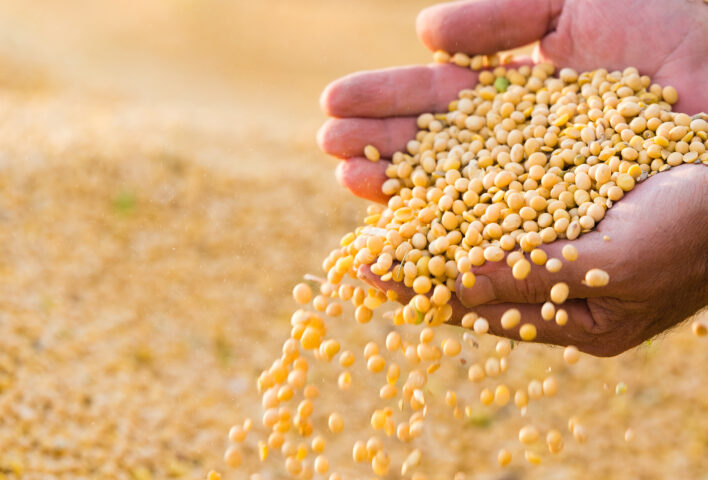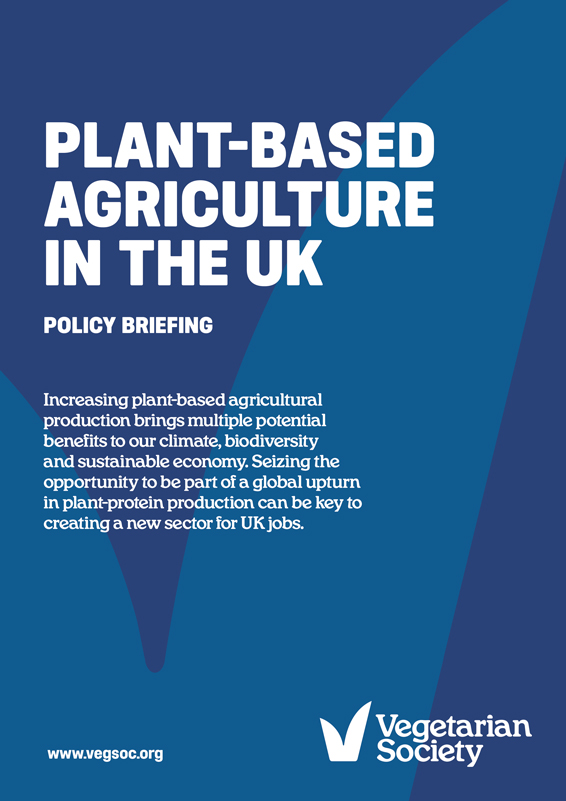Future Farming
FUTURE FARMING
Unearthing Plant-Based Agriculture

Why is this important?
As a champion of a sustainable UK farming sector the Vegetarian Society is committed to working with farmers in order to deliver a just transition away from livestock farming for meat with land instead used for arable crops, horticulture and rewilding. We believe UK farmers can lead the way in enhancing our food security, reducing carbon emissions and boosting the nation’s biodiversity.
Because increasing plant-based agricultural production brings multiple potential benefits to our climate and our biodiversity.
And moving away from livestock farming for meat can not only help deliver more financial security for farmers but also boost UK food security.
70% of land across the UK is used for agriculture. And while 80% of agricultural land supports animal farming, only 15% is currently used to produce food crops for human consumption. Moreover the 80% of land used to farm animal produces only 32% of the calories we consume as a nation and less than half the protein.
Imagine if we could deliver a more efficient system and repurpose UK agricultural land to grow a broader range of crops, vegetables and fruit for direct human consumption. And furthermore free up even more land for rewilding, carbon capture and renewables.
We could deliver a renaissance in UK farming, putting it at the heart of our plans for food security, for health, for climate and for biodiversity and nature recovery.
What needs to happen?
We need major policy shifts on land management and agriculture.
We need a broad ‘farm to fork’ model, focused on a just and fair transition to plant-based proteins, plus a greater focus on arable crops and horticulture for human consumption. Studies and field trials demonstrate that a number of protein crops can be grown viably in the UK, including lentils, soya, fava beans and various types of pea, replacing meat as our primary source of protein.
In particular, the government’s introduction of ELMS (Environmental Land Management System), a new sustainable approach to farm subsidy, utilises ‘public money for public goods’ but in its current form does not encompass gearing up plant-based protein agriculture for human consumption.
Nor, importantly, does plant-based protein figure in the Agriculture and Horticulture Development Board’s (AHDB) six agricultural industry sectors which it currently supports.
And beyond the farm gate, we need to ensure we have the manufacturers and the retail led supply chains that can take advantage of the wider variety and greater supply of plant-based crops.
Indeed, the government’s own commissioned National Food Strategy from Henry Dimbleby urged action to support the creation of a competitive UK domestic marketplace for alternative proteins, with the market opportunities for plant-based agricultural innovation growing significantly.
And from an economic perspective, a well-managed sustainable agricultural transition can protect rural jobs. The commissioned Dimbleby National Food Strategy estimated that plant-protein development in the UK could create 10,000 manufacturing jobs and secure 6,500 jobs in farming.

What is the Vegetarian Society doing?
The Society aims to play a key role in driving a just transition towards a more sustainable farming sector. In particular, we will be undertaking research and developing policy focused campaigns, which seek to:
- Ensure that plant-based proteins are a key part of the government’s upcoming ‘Land Use Framework’.
- Ensure that ‘protein crops’ are incorporated within the AHDB’s portfolio.
- Develop a new farm entry scheme for focused on protein crops to attract a new generation of sustainably-minded farmers.
- Support the horticulture sector, to ensure UK producers receive adequate funding and prices for their produce
- Put plant-protein production to the fore within the Back British Farming portfolio.
- Introduce mandatory reporting of protein crop production and allow data collection to track progress and feed into future planning
DOWNLOAD OUR POLICY BRIEFING
If you would like more information on our work , please download our policy briefing titled: “PLANT-BASED AGRICULTURE IN THE UK“

